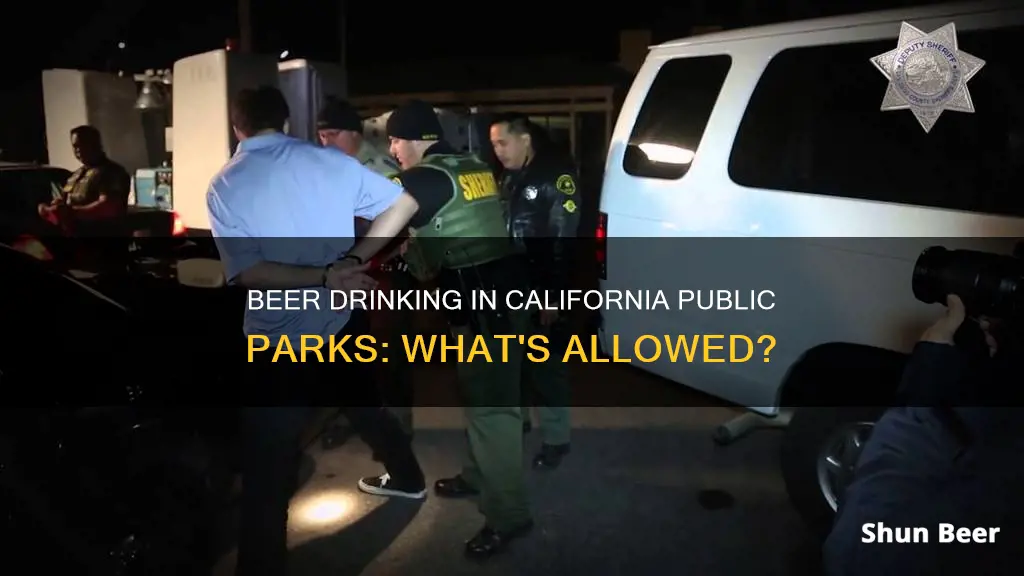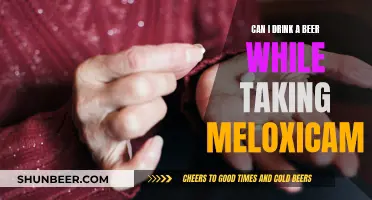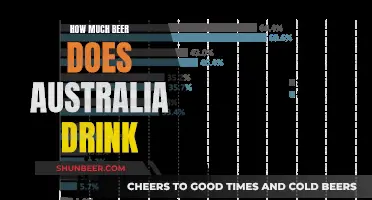
Drinking in public spaces, including parks, is generally illegal in California. However, some parks in the state have designated areas where alcohol consumption is permitted. These areas are typically restricted to wine and beer, with hard liquor, glass containers, and kegs prohibited. While public intoxication is considered a form of disorderly conduct, possessing an open container of alcohol in public is usually only an infraction, resulting in a ticket and a fine rather than jail time. California's open container laws include two exceptions: when a license has been issued for alcohol possession and when the container is being recycled.
What You'll Learn

Drinking in public is generally illegal in California
California's open container laws make it illegal to possess an open alcohol container in any public place. This includes any bottle, can, or other receptacles that have been opened, had their seal broken, or had their contents partially removed. Public spaces can include city or county parks, recreational districts, and open-space districts. These laws aim to prevent public intoxication and disorderly conduct, ensuring the safety and comfort of all individuals in shared spaces.
The state makes a distinction between drinking in licensed venues, such as bars and restaurants, and drinking in unlicensed public spaces. It is generally illegal to drink outside of licensed venues, and individuals found with open containers in public may be cited or even arrested. However, there are a few exceptions to these open container laws.
The first exception is when a license has been obtained to possess and consume alcohol in a specific location, such as a park or public event. The second exception is when the alcohol container is being possessed for recycling purposes, such as carrying empty cans or bottles to a recycling center. Additionally, individuals can legally drink alcohol on their front lawns as long as they remain on private property.
While public drinking is generally prohibited, some parks in California may have designated areas where alcohol consumption is allowed. For example, Golden Gate Park in San Francisco has several picnic areas that allow wine and beer consumption, as long as there are no glass containers, hard alcohol, or kegs. Similarly, Lake Temescal in Oakland permits wine and beer consumption but prohibits hard alcohol. It is important to check the regulations of specific parks before consuming alcohol on their premises.
The consequences of drinking in public can vary. In some cases, individuals may receive a ticket and a fine, while in other cases, they may face jail time, particularly if they are found to be intoxicated to the point of endangering themselves or others. Minors found in possession of alcohol in public may face misdemeanor charges, community service, and fines.
Digital Beer Rebates: How Do They Work?
You may want to see also

Open containers of alcohol are not allowed in public spaces
In California, open containers of alcohol are generally not allowed in public spaces. This means that drinking in public spaces, such as parks, is illegal. California law BPC 25620 states that it is an infraction for any individual to possess an open alcohol container in any public place. This includes any can, bottle, or other receptacle that has been opened, had its seal broken, or had its contents partially removed. Public places include any city or county park, city or county-owned public place, recreational district, or open-space district.
However, there are a few exceptions to this rule. Drinking alcohol in public spaces is permitted in areas that have obtained a license for alcohol, such as obtaining a license for a party at a park where beer is present. Additionally, possession of an open container of alcohol is allowed for recycling purposes, such as carrying a bag of empty beer cans to redeem their California Redemption Value (CRV).
Specific parks in California may also have designated areas where alcohol consumption is allowed. For example, Golden Gate Park in San Francisco has several picnic areas that are designated as alcohol-friendly, including Horseshoe Courts Picnic Area, Bunny Meadow, and Chinese Pavilion at Stow Lake. Lake Temescal in Oakland also allows wine and beer consumption, while hard alcohol is prohibited.
It is important to note that local ordinances can impose stricter regulations or penalties for public drinking, and these can vary between cities and counties. Therefore, it is essential to be aware of the specific local laws and regulations before consuming alcohol in public spaces.
While some people may choose to discreetly drink alcohol in parks, it is important to follow the law and respect the rules and regulations in place. Consuming alcohol in public spaces without a permit can result in citations or legal consequences.
Beer and Tamiflu: Is It Safe to Drink?
You may want to see also

Minors possessing alcohol in public is illegal
In California, it is illegal for minors to possess or consume alcohol in any public place. This includes public parks, bars, restaurants, and beaches. If a minor is seen consuming alcohol in a public place, they can be charged with minor in possession (MIP).
The legal drinking age in California is 21 years old. Anyone under 21 is considered a minor and is prohibited from possessing or consuming alcohol in public. Minors found in violation of this law can face legal consequences, including fines, community service, and a suspension of their driver's license.
The penalties for minor in possession of alcohol in California can be severe. It is considered a misdemeanor offense, which means it will go on the minor's criminal record and can impact their future opportunities. The specific penalties can vary depending on the circumstances and the number of offenses. For a first offense, the minor may be required to pay a fine of up to $250 and perform community service for 24 to 32 hours. Subsequent offenses can result in higher fines of up to $500 and increased community service hours of 36 to 48 hours.
In addition to the legal consequences, it's important to consider the potential risks associated with underage drinking. Alcohol consumption can impair judgment and increase the risk of accidents, injury, or dangerous situations. It is crucial for minors to understand the risks and make informed decisions to ensure their safety and well-being.
If a minor is struggling with alcohol abuse or addiction, it is essential to seek professional help. There are various resources available, such as counseling programs, alcohol treatment centers, and juvenile criminal defense lawyers who can provide guidance and support. By addressing the issue early on, minors can reduce the negative impact on their lives and work towards a healthier future.
Beer and Teeth Whitening: What You Need to Know
You may want to see also

Public intoxication is illegal
In California, public intoxication is illegal. This means that it is generally illegal to drink in public outside of a licensed venue such as a bar, restaurant, or tavern. State and local laws make it an infraction to possess an open container of alcohol in public spaces, including recreation or park districts and open-space districts.
Public intoxication is considered a form of disorderly conduct. Under California Penal Code 647(f) PC, it is a misdemeanor offense to be drunk in public. To be convicted of public intoxication, the prosecutor must prove beyond a reasonable doubt that the defendant:
- Was willfully under the influence of alcohol or drugs: This means that the defendant must have voluntarily consumed the alcohol or drugs, and it was not done by accident or force.
- Was in a public place: A public place is defined as a place that is open and accessible to anyone who wishes to go there. This includes not only streets, sidewalks, and parks but also a car parked on a public street, a common hallway in an apartment building, and the area in front of someone's house, including the driveway, front lawn, and front porch.
- Was unable to exercise care for their own safety or the safety of others: This is determined by looking at all the facts and circumstances of the case, such as the perceptions of the police officer, results of a breathalyzer, and perceived dangers to the public.
- Obstructed the free use of public streets or sidewalks: This includes interfering with, obstructing, or preventing the use of a public path or street due to being under the influence.
The penalties for public intoxication in California can include up to six months in county jail, a fine of up to $1,000, or both. It is important to note that public intoxication can also have negative consequences on various aspects of one's life, including employment, housing, education, and professional licensing opportunities.
Fireball and Beer: A Safe Mix?
You may want to see also

Drinking is allowed in some Bay Area parks
While drinking alcohol in public parks is generally prohibited in California, there are some Bay Area parks that allow drinking in specific areas. It's important to note that public intoxication and possessing an open container of alcohol in public are infractions, and drinking laws vary depending on the park and the city or county governing them. Here are some Bay Area parks where drinking is permitted in certain sections:
Golden Gate Park, San Francisco
Golden Gate Park offers several picnic areas where you can enjoy a cold beer or a glass of wine. Popular spots include the Horseshoe Courts Picnic Area, Bunny Meadow, Chinese Pavilion at Stow Lake, Speedway Meadow, Hellman Hollow, Lindley Meadow, and Strawberry Hill Picnic Area. Remember, no glass, hard alcohol, or kegs are allowed.
Lake Temescal, Oakland
Lake Temescal is another park that permits drinking wine and beer. You can enjoy a picnic with your favourite beverage, go for a swim, sunbathe, or even try fishing.
Sonoma Plaza Park, Sonoma
Sonoma Plaza Park is one of the few parks that allow drinking any alcoholic beverage. From 11 a.m. until dark, you can bring a bottle of wine or a few beers and enjoy them with some cheese or sandwiches.
Kelley Park, San Jose
Kelley Park, spanning 172 acres, offers large lawn areas for picnics and barbecues. Alcohol is permitted at the park's picnic sites, making it a great spot for outdoor gatherings.
Golden Gate National Recreation Area, San Francisco
The Golden Gate National Recreation Area, controlled by the U.S. National Park Service, permits drinking wine and beer in most of its parks. Popular spots include China Beach, Fort Funston, Fort Mason, Lands End, and Crissy Field. However, alcohol is prohibited in certain areas like Ocean Beach, Alcatraz, and Sutro Baths.
Martin Luther King Jr. Park and Wildcat Canyon/Alvarado Park
These parks, located in the East Bay, allow beer and wine in certain areas. However, a $25 permit must be purchased for reserved picnic areas where alcohol is restricted.
It's important to note that while drinking may be permitted in certain Bay Area parks, glass containers, kegs, and hard liquor are typically prohibited. Additionally, drinking laws can vary, and it's always a good idea to check the specific rules of the park you plan to visit.
The Mechanics of Chugging: Beer Bong Functionality Explained
You may want to see also







